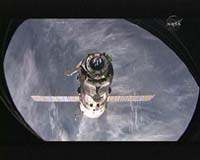 |
Troy NY (SPX) May 11, 2010 A team of researchers from Rensselaer Polytechnic Institute will send an army of microorganisms into space this week, to investigate new ways of preventing the formation and spread of biofilms, or clusters of bacteria, that could pose a threat to the health of astronauts. The Micro-2 experiment, led by Cynthia Collins, assistant professor in the Department of Chemical and Biological Engineering at Rensselaer, is scheduled to launch into orbit on May 14 aboard Space Shuttle Atlantis. The microorganisms will spend a week in space before returning to Earth aboard the shuttle. Within just a few hours after the shuttle's return, Collins will be able to examine the bacteria and resulting biofilms to see how their growth and development were impacted by microgravity. The samples also will be returned to Rensselaer, to be examined using the core facilities of the Institute's Center for Biotechnology and Interdisciplinary Studies. "We know that gravity plays a key role in the development of biological systems, but we don't know exactly how a lack of gravity affects the development of bacteria and biofilms," Collins said. "This means while certain bacteria may be harmless on Earth, they could pose a health threat to astronauts on the International Space Station or, one day, long space flights. Our goal is to better understand how microgravity affects the relationship between humans and bacteria, so we can develop new ways of reduce the threat of biofilms to spacecraft and their crew." Partnering with Collins on the Micro-2 project are nanobiotechnology expert Jonathan Dordick, the Howard P. Isermann Professor of Chemical and Biological Engineering at Rensselaer and director of the university's Center for Biotechnology and Interdisciplinary Studies, and thin films expert Joel Plawsky, professor in the Department of Chemical and Biological Engineering. NASA is funding the experiment. Biofilms are complex, three-dimensional microbial communities. Bacteria commonly found in nature are often in the form of biofilms. Most biofilms, including those found in the human body, are harmless. Some biofilms, however, have shown to be associated with disease. Additionally, biofilms in locations such as hospitals - or confined locations like space shuttles - have exhibited resistance to antibiotics. This could pose a problem for astronauts, who have been shown to have an increased susceptibility to infection while in microgravity. Collins and her team will send up eight devices, called group activation packs (GAPs) and each containing 128 vials of bacteria, aboard the shuttle. While in orbit, astronauts will begin the experiment by manipulating the sealed vials and introducing the bacteria to different membranes. At the same time, Collins will perform the same actions with identical GAPs still on Earth at the Kennedy Space Center in Florida. After the shuttle returns, her team will compare the resulting biofilms to see how the behavior of bacteria and development of biofilms in microgravity differed from the control group. The experiment uses BioServe Space Technologies flight-certified hardware. The Micro-2 research team will also test if newly developed, nanotechnology-based antimicrobial surfaces - developed by Dordick at Rensselaer - can help slow the growth of biofilms on Earth and in microgravity. If successful, these new antimicrobial surfaces could one day be used in hospitals and spacecraft to help reduce the impact of biofilms on human health.
Share This Article With Planet Earth
Related Links Rensselaer Polytechnic Institute Station at NASA Station and More at Roscosmos S.P. Korolev RSC Energia Watch NASA TV via Space.TV Space Station News at Space-Travel.Com
 Russian Space Freighter Ready To Leave Orbital Station
Russian Space Freighter Ready To Leave Orbital StationMoscow (RIA NOVOSTI) May 10, 2010 The crew of the International Space Station (ISS) has loaded a Russian space freighter with garbage and readied the spacecraft for undocking, Mission Control said on Friday. The Progress M-04M space freighter has been docked with the ISS since February 5, and is scheduled to leave the orbital station on May 10. "The command for undocking will be issued at 14:13 Moscow time [10.13 GMT ... read more |
|
| The content herein, unless otherwise known to be public domain, are Copyright 1995-2010 - SpaceDaily. AFP and UPI Wire Stories are copyright Agence France-Presse and United Press International. ESA Portal Reports are copyright European Space Agency. All NASA sourced material is public domain. Additional copyrights may apply in whole or part to other bona fide parties. Advertising does not imply endorsement,agreement or approval of any opinions, statements or information provided by SpaceDaily on any Web page published or hosted by SpaceDaily. Privacy Statement |